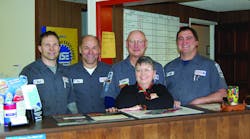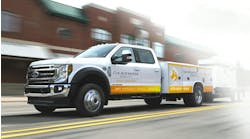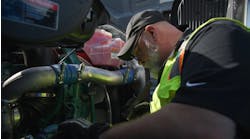John Meyerhofer is the owner and operator of JM Mechanical, Inc in Cranby, Ore. In business since 1977, JM Mechanical offers “old fashioned service with the latest technology.”
Focus on training
One concession to modern methods is the fact that John and all three of his technicians are ASE certified. He is proud of the fact that even oil changes are performed by certified technicians, “and not (by) someone that hasn’t been trained.”
In fact, he places so much importance on training that he pays for his techs to attend six classes each year at the regional CarQuest Technical Institute.
A growing business
Originally opened as a one-man shop, the business grew steadily and JM Mechanical moved to its current location in 1986. As the business grew even more, John hired technicians and gradually assumed more of the front office work, including dealing with the customers, scheduling the work and ordering parts, plus all the back-office work too.
Last year John was injured and had to spend time away from the business, so another service writer was hired to fill in. This less-than-ideal situation turned into a major interruption in the normal workflow, but now that John has returned, he’s gradually reestablishing the smooth operation they all enjoyed before.
Shop layout
The shop itself is basically one large room that can hold eight cars comfortably, but will accommodate 11 if needed.
Each side of the shop is organized for different jobs. On one side it’s easier to move cars in and out, so that’s used for short-term projects like LOF and diagnostic work. The other side has four bays but only two have a lift. That’s OK, because they work on anything that comes in the door, from domestics to hybrids to imported sports cars and right on up to medium diesel trucks and motorhomes.
While some of the equipment is definitely ‘vintage,’ (and why not after 33 years in business?), newer equipment includes a Motorvac, a smoke machine and a fairly new Robinair refrigerant recovery/recycling machine. Diagnostic equipment includes a Modis, a Genysis scanner/scope and, of course, the venerable Red Brick. Each tech has their own computer that they use for receiving work orders and accessing information from Alldata, Identifix and iATN.
When asked about the most important tools in the shop, John said the hand tools and particularly the air tools are more important than even the lab scopes and lifts.




